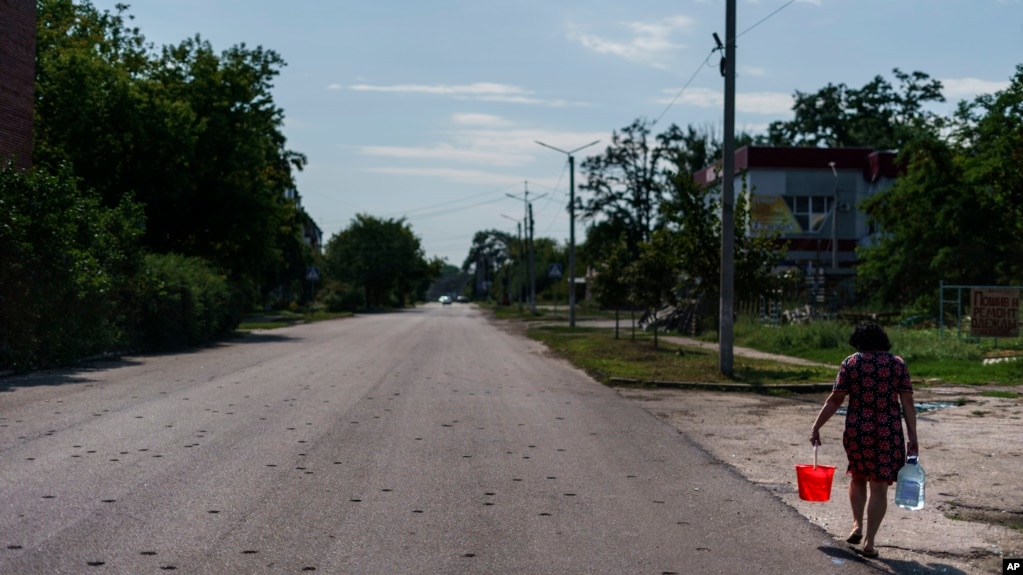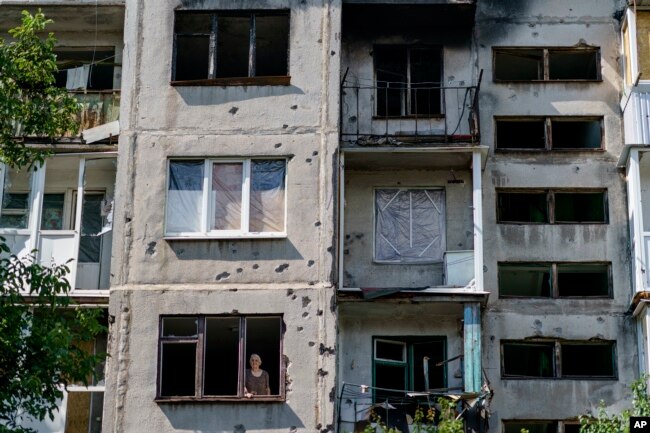Water Crisis Threatens East Ukrainian City

The eastern Ukrainian city of Sloviansk has a severe shortage of water. Members of the city’s shrinking population must fill water containers by hand at public wells throughout the city.
As guns and rockets fire, people go outside only long enough to get water at the pumps. The pumps have been the city's only water source for more than two months.
Fighting between Ukrainian and Russian forces near the city in the Donetsk area has threatened access to important resources. Residents have been cut off from gas and water for months.
The water flows for now. But many fear that by winter, the city could face a humanitarian crisis once the pipes begin to freeze. Sloviansk sits just 12 kilometers from Russian-occupied territory.
Lyubov Mahlii, 76, packs a crate with water bottles she filled up at a public tank to take back to her apartment in Sloviansk, Donetsk region, eastern Ukraine, Saturday, Aug. 6, 2022. " (AP Photo/David Goldman)
“The water infrastructure was destroyed by the constant battles,” said Lyubov Mahlii. The 76-year-old woman gathers 20 liters of water twice a day from a public tank near her apartment.
"It’s a great risk for us, but what can we do?” she said.
Only a fifth of the city's pre-war population of 100,000 remains. Heavy fighting continues only kilometers away as Russian forces continue their push to take over Donetsk, part of the industrial Donbas area.
Local officials believe the water situation will only get worse once the weather gets cold.
Locals fill their bottles with hand pumps or from plastic tanks at one of the five public wells. They then carry them home in bicycle baskets or wheeled carts.
Mahlii said she boils some water for at least 15 minutes to make sure it is safe to drink. The rest is used for bathing, washing clothes and dishes, watering plants and taking care of a lost dog.
Ukrainian President Volodymyr Zelenskyy issued an evacuation order to all residents of the Donetsk region at the end of July. But, Mahlii has not made plans to flee.
“I don’t want to leave,” she said. “I will die here.”
Another Sloviansk resident, 75-year-old Ninel Kyslovska, gathered water from a tank at a park on Sunday. She said the shortage had made her life much more difficult.
She blamed the local government for the lack of running water. She said Kramatorsk, just 10 kilometers to the south, still had running water in homes.
But that may be threatened once winter arrives, when the temperature drops to -20 degrees Celsius, said Oleksandr Goncharenko. He is the head of Kramatorsk's military administration.
He said that places like Sloviansk and Kramatorsk — which also lack gas — had become “hostages of destroyed infrastructure.”
Goncharenko said Kramatorsk will empty water from city pipes that run into unheated buildings to prevent them from freezing and bursting. He said he does not think gas would be returned before winter.
Ukrainian officials are still trying to persuade the remaining people in Donetsk to evacuate. The war's front line threatens to move further west. And it will be very hard for people to live in the cold winters.

Ida Svystunova, 89, looks out the damaged room adjoining her apartment from a May rocket attack in Sloviansk, Donetsk region, eastern Ukraine, Sunday, Aug. 7, 2022. (AP Photo/David Goldman)
Officials in Kramatorsk plan to build more public wells to supply the remaining population. But Goncharenko warned the water may not be of good quality.
Mahlii has not made plans for what she will do once cold weather arrives. But after 47 years in her Sloviansk apartment, she will face whatever difficulty.
“We are surviving by any means,” she said.
Words in This Story
access — n. the right or ability to approach, enter, or use
resident — n. a person who lives in a place
infrastructure — n. the system of public works of a country, state, or region
constant — adj. occurring continuously or following one after another
evacuate — v. to leave or cause to leave a place of danger
https://learningenglish.voanews.com/a/water-crisis-threatens-east-ukrainian-city/6692862.html